The ASRock DeskMini 310 Mini-PC Review: A Cost-Effective Mini-STX Platform
by Ganesh T S on March 15, 2019 9:30 AM ESTMiscellaneous Performance Metrics
This section looks at some of the other commonly used benchmarks representative of the performance of specific real-world applications.
3D Rendering - CINEBENCH R15
Our SFF PC reviews use CINEBENCH R15 for 3D rendering evaluation. The program provides three benchmark modes - OpenGL, single threaded and multi-threaded. Evaluation of different PC configurations in all three modes provided us the following results.
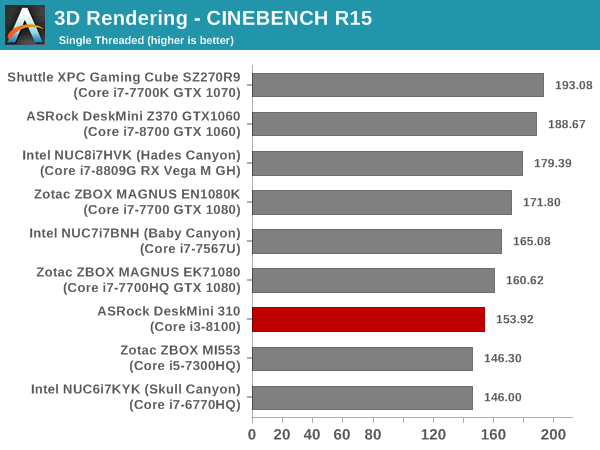
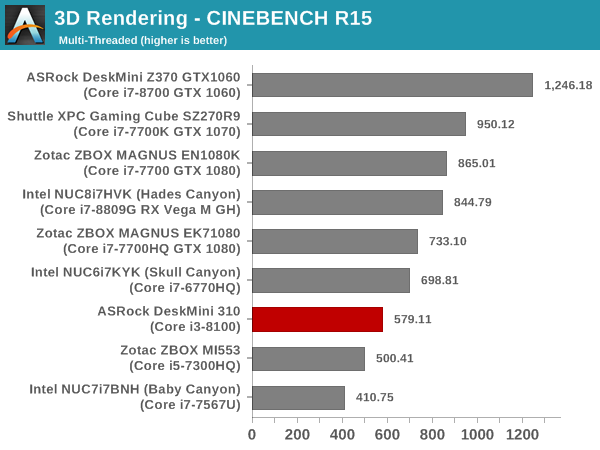
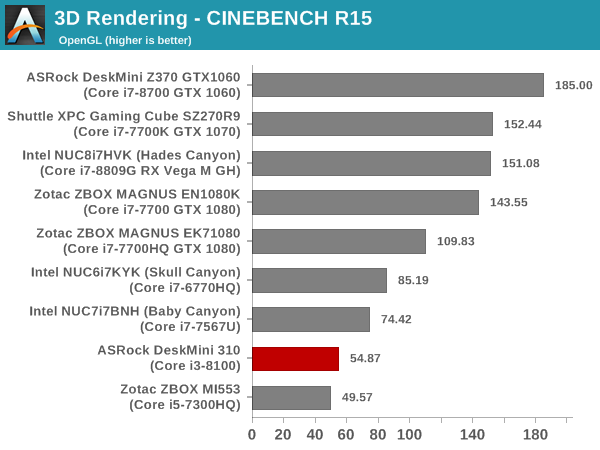
The TDP of the Core i3-8100 allows the DeskMini 310 to come out with better single-threaded performance compared to the Skull Canyon NUC, but loses out in the multi-threading case due to the absence of hyperthreading.
x265 Benchmark
Next up, we have some video encoding benchmarks using x265 v2.8. The appropriate encoder executable is chosen based on the supported CPU features. In the first case, we encode 600 1080p YUV 4:2:0 frames into a 1080p30 HEVC Main-profile compatible video stream at 1 Mbps and record the average number of frames encoded per second.
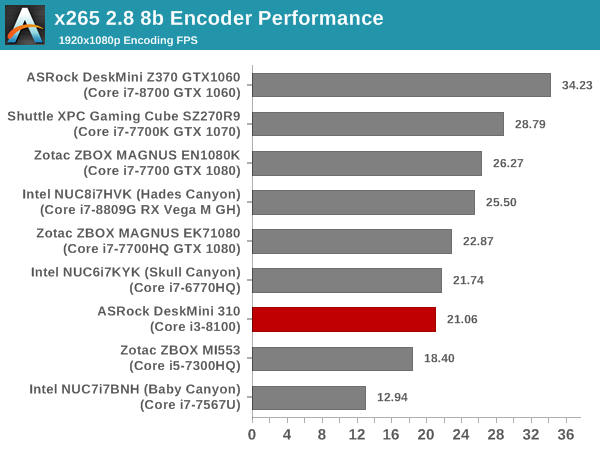
Our second test case is 1200 4K YUV 4:2:0 frames getting encoded into a 4Kp60 HEVC Main10-profile video stream at 35 Mbps. The encoding FPS is recorded.
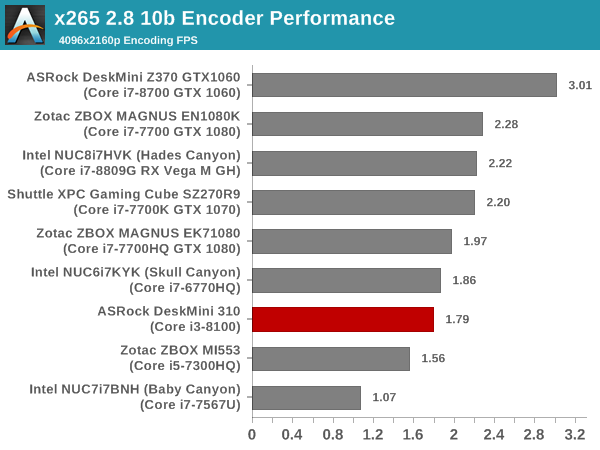
Performance with x265 is very similar to the other workloads we have considered so far. The DeskMini 310 / Core i3-8100 is better than the Zotact ZBOX MI553 / Core i5-7300HQ, but, other systems with Core i7 CPUs almost always perform better.
7-Zip
7-Zip is a very effective and efficient compression program, often beating out OpenCL accelerated commercial programs in benchmarks even while using just the CPU power. 7-Zip has a benchmarking program that provides tons of details regarding the underlying CPU's efficiency. In this subsection, we are interested in the compression and decompression rates when utilizing all the available threads for the LZMA algorithm.
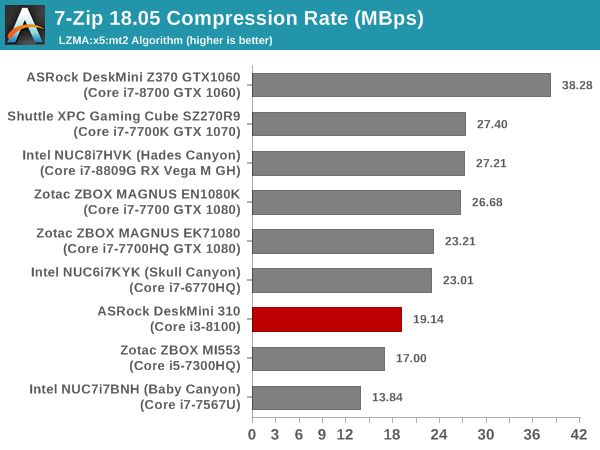
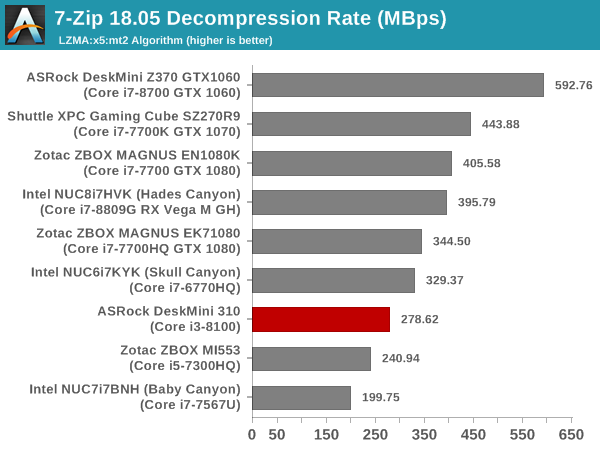
The scenario seen in the x265 benchmark is seen in the 7-Zip case also.
Cryptography Benchmarks
Cryptography has become an indispensable part of our interaction with computing systems. Almost all modern systems have some sort of hardware-acceleration for making cryptographic operations faster and more power efficient. In this sub-section, we look at two different real-world applications that may make use of this acceleration.
BitLocker is a Windows features that encrypts entire disk volumes. While drives that offer encryption capabilities are dealt with using that feature, most legacy systems and external drives have to use the host system implementation. Windows has no direct benchmark for BitLocker. However, we cooked up a BitLocker operation sequence to determine the adeptness of the system at handling BitLocker operations. We start off with a 2.5GB RAM drive in which a 2GB VHD (virtual hard disk) is created. This VHD is then mounted, and BitLocker is enabled on the volume. Once the BitLocker encryption process gets done, BitLocker is disabled. This triggers a decryption process. The times taken to complete the encryption and decryption are recorded. This process is repeated 25 times, and the average of the last 20 iterations is graphed below.
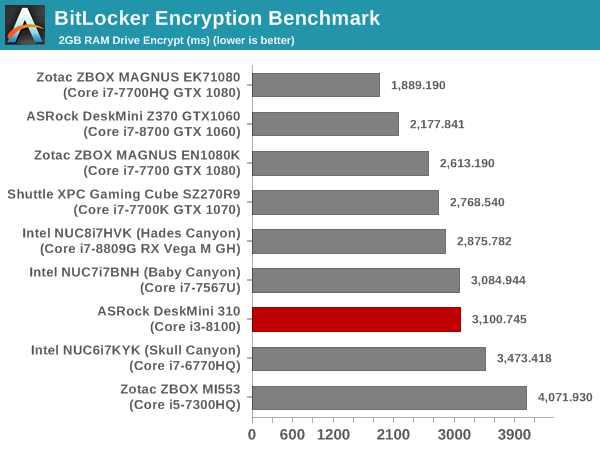
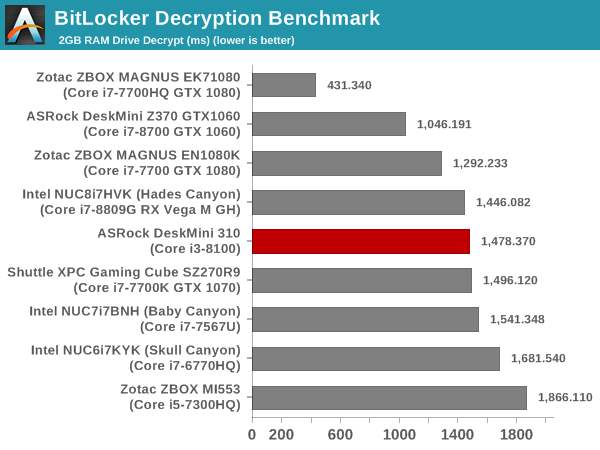
The clocks of the Core i3-8100 help the DeskMini 310 appear in the middle of the pack in the cryptography benchmarks.
Creation of secure archives is best done through the use of AES-256 as the encryption method while password protecting ZIP files. We re-use the benchmark mode of 7-Zip to determine the AES256-CBC encryption and decryption rates using pure software as well as AES-NI. Note that the 7-Zip benchmark uses a 48KB buffer for this purpose.
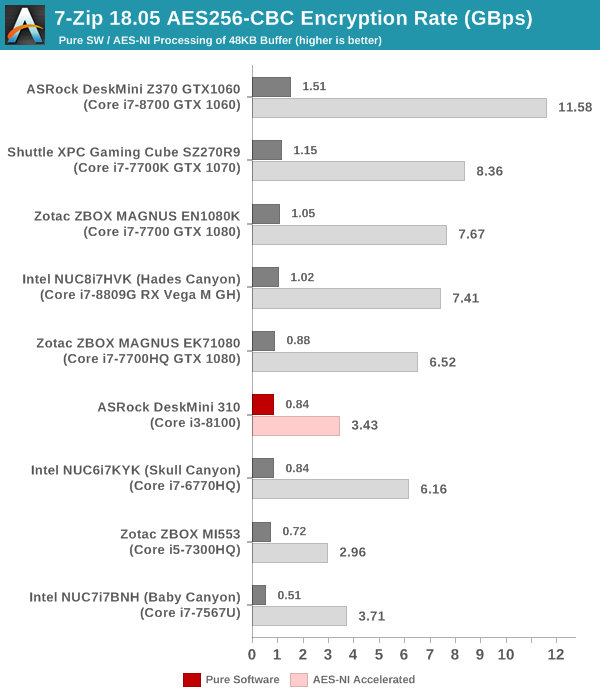
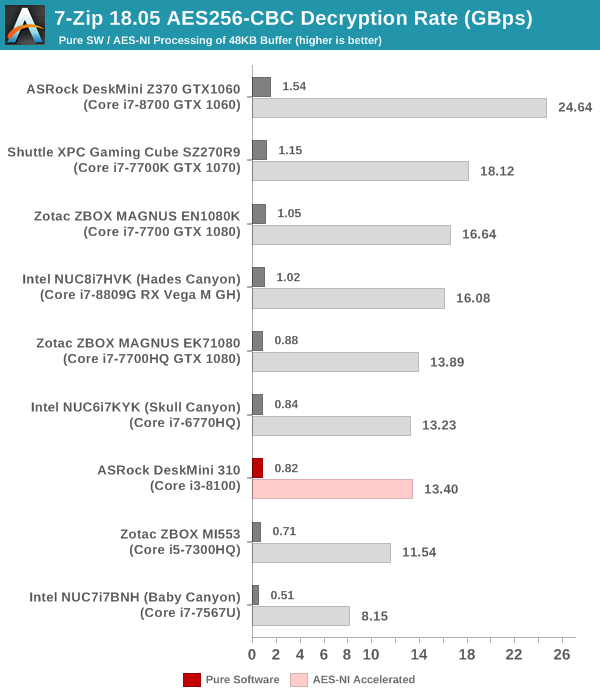
Yet another cryptography application is secure network communication. OpenSSL can take advantage of the acceleration provided by the host system to make operations faster. It also has a benchmark mode that can use varying buffer sizes. We recorded the processing rate for a 8KB buffer using the hardware-accelerated AES256-CBC-HAC-SHA1 feature.
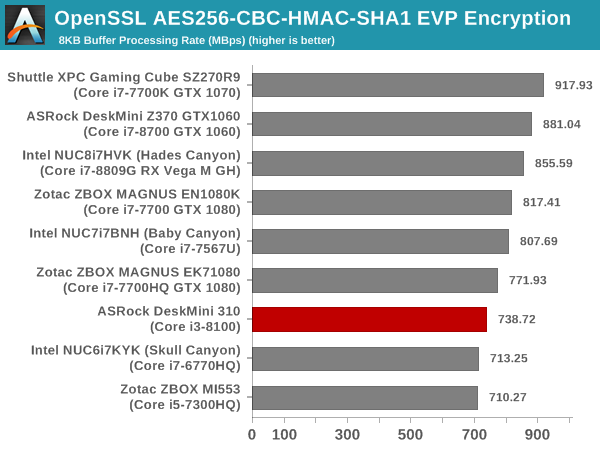
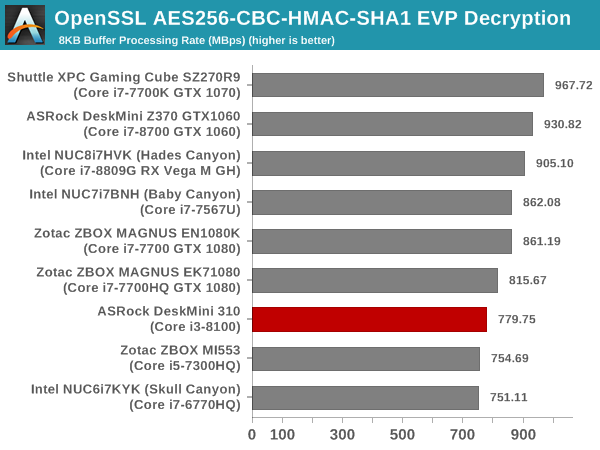
We see the same relative positions across all the cryptography benchmarks, with the DeskMini 310 managing to consistently surpass only the Zotac ZBOX MI553.
Agisoft Photoscan
Agisoft PhotoScan is a commercial program that converts 2D images into 3D point maps, meshes and textures. The program designers sent us a command line version in order to evaluate the efficiency of various systems that go under our review scanner. The command line version has two benchmark modes, one using the CPU and the other using both the CPU and GPU (via OpenCL). We present the results from our evaluation using the CPU mode only. The benchmark (v1.3) takes 84 photographs and does four stages of computation:
- Stage 1: Align Photographs (capable of OpenCL acceleration)
- Stage 2: Build Point Cloud (capable of OpenCL acceleration)
- Stage 3: Build Mesh
- Stage 4: Build Textures
We record the time taken for each stage. Since various elements of the software are single threaded, and others multithreaded, it is interesting to record the effects of CPU generations, speeds, number of cores, and DRAM parameters using this software.
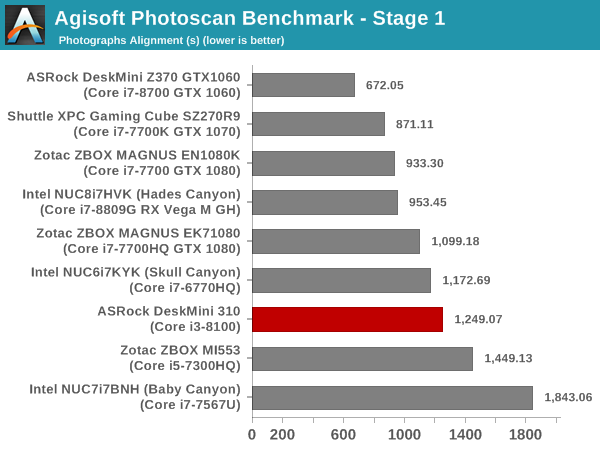
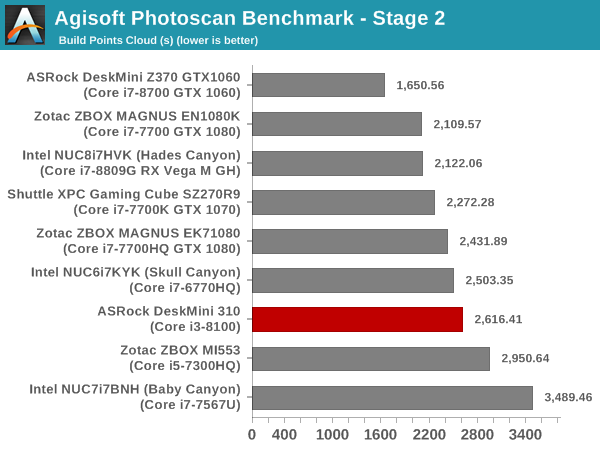
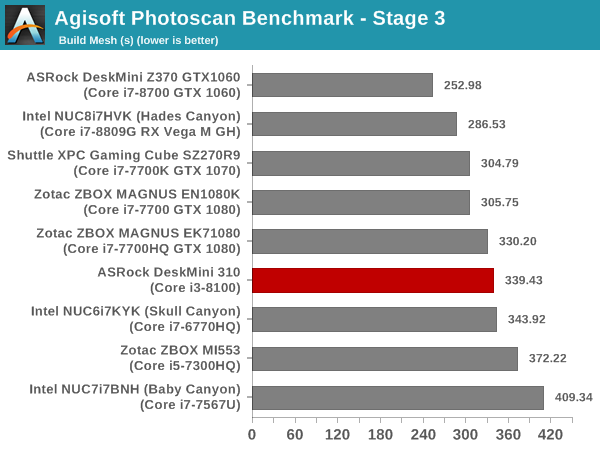
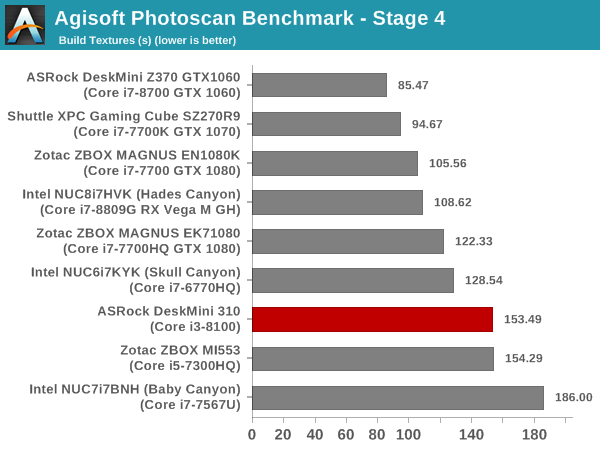
Here, we see the same relative behavior of the Core i3-8100 being unable to consistently surpass PCs with CPUs other than the Core i5-7300HQ.
Dolphin Emulator
Wrapping up our application benchmark numbers is the new Dolphin Emulator (v5) benchmark mode results. This is again a test of the CPU capabilities/

The DeskMini 310 moves to the middle of the set in this emulator benchmark.










48 Comments
View All Comments
guidryp - Friday, March 15, 2019 - link
They really need to do one of these with AMD APU chips for a decent mix of CPU/GPU performance.Ashinjuka - Friday, March 15, 2019 - link
They do. It supports Raven Ridge.https://www.asrock.com/nettop/AMD/DeskMini%20A300%...
guidryp - Friday, March 15, 2019 - link
Thanks.Death666Angel - Friday, March 15, 2019 - link
I want the motherboard only to mod my own case around it (ATX PSU case mods are great). 150€ is just too much, unfortunately, especially for that "non-chipset" A300. 100€ and I'd think about it.Lcs006 - Monday, March 18, 2019 - link
Here U go!https://item.taobao.com/item.htm?id=583127994911
Irata - Friday, March 15, 2019 - link
A side by side comparison of the Intel and AMD desk mini would have been nice.@AT: Could Asrock also supply you with the AMD based desk mini system ? Would be interesting since that is a first for them.
ganeshts - Friday, March 15, 2019 - link
The DeskMini A300 came into our testbed just yesterday. I hope to have the review up in the next 3 - 4 weeks.voodoobunny - Friday, March 15, 2019 - link
Squeeee!PixyMisa - Friday, March 15, 2019 - link
Great, looking forward to it!AdditionalPylons - Saturday, March 16, 2019 - link
Yes!!! Very much looking forward to that review!